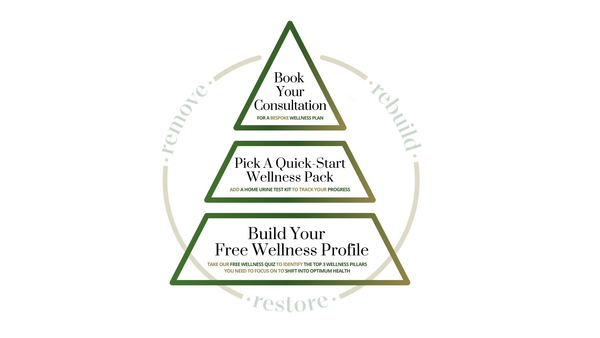Restrictive crash diets and harsh detoxes are often promoted at this time of the year to rid the body of toxins as part of New Year's resolutions, but did you know that most New Year's Resolutions have failed by February?
Nourish, Don’t Punish Your Body
When I had eating disorders, I would follow hardcore diets and exercise regimes as a way to punish myself for what I did the day before. I understand your pain and frustration if you struggle in this area.
I’m a big fan of seasonal cleanses, but these need to be done to nourish your mind and body into wellness. If you’re currently in winter, it is not a good time for a strict detox with raw foods but rather a time to nourish and use warm healing foods to support the body’s natural ability to heal and reset.
Support Natural Body Detoxification
The liver and kidneys primarily carry out the natural detoxification mechanisms of the human body. If we turn down the noise and turn up the science, we can achieve abundant health and live in a body we genuinely love.
Establish Daily Wellness Habits
I prefer to start the year gently and give myself the first week of January to embrace my daily wellness habits. I get still, go into nature, spend time with loved ones, journal, dream and pray about the year ahead and how I can help bring more healing and love to those in my world.
I start by keeping it simple and dial back to my good habits that tend to get out of sync over the holidays, especially since we were blessed to have friends and family staying with us (so more wine and rich foods than normal).
Drink, Walk & Sleep
Begin by mixing 2 litres of Rejuv Wellness Water for daily drinking. Aim for more walking and get your daily steps up to 10,000, go to bed at least 1 hour before midnight, and find stillness to breathe and check in with yourself. Reduce alcohol, sugar and junk food.
Avoid Failing Your Resolutions by February
So why do New Year's resolutions often fail? From what I have seen over the years, it’s due to a combination of these 12 psychological, behavioural, and environmental factors:
- Unrealistic Expectations: People often set overly ambitious goals without considering the practicality of achieving them. Unrealistic goals can lead to frustration and a sense of failure.
- Lack of Planning: Many resolutions lack a concrete plan. Without a detailed roadmap, individuals often struggle to take the necessary steps toward achieving their goals.
- Too Many Goals: Trying to change multiple aspects of life simultaneously can be overwhelming. Focusing on a few well-defined goals increases the chances of success.
- Lack of Intrinsic Motivation: Resolutions that are not deeply meaningful or connected to personal values may lack the intrinsic motivation to sustain long-term efforts.
- Failure to Track Progress: Individuals may lose sight of their goals without monitoring progress. Regularly assessing achievements can provide motivation and help adjust strategies if necessary.
- All-or-Nothing Thinking: Adopting an all-or-nothing mindset, where any deviation from the plan is seen as a failure, can lead to discouragement and abandonment of the resolution.
- Ignoring Setbacks: Setbacks are a natural part of the change process. People who don't anticipate or know how to deal with setbacks often become discouraged and give up on their resolutions.
- Social and Environmental Influences: External factors, such as the influence of friends, family, or the environment, can impact one's ability to maintain new habits. A lack of support or exposure to triggers can hinder progress.
- Lack of Accountability: Individuals may struggle to stay committed to their resolutions without external accountability or support. Sharing goals with others or seeking guidance from a mentor can provide accountability.
- Overlooking Emotional Factors: Emotional well-being plays a significant role in behavioural change. Stress, anxiety, or other emotional factors can undermine one's ability to stick to resolutions.
- Not Enjoying the Process: Individuals may lose motivation if the journey toward achieving a resolution is perceived as tedious or unpleasant. Finding ways to enjoy the process can increase commitment.
- Impatience: Sustainable change takes time, and impatience can lead to premature abandonment of resolutions. Recognising and appreciating small victories along the way can help maintain motivation.
Understanding these factors can help you set more realistic and achievable resolutions. It's crucial to approach resolutions with a flexible mindset, be willing to adapt strategies, seek support when needed, and focus on the long-term benefits of positive changes.

A Guided Tour Towards Your Long-Term Wellness Goals
Playing the long game to bring about lifestyle changes is the only way to have long-term success.
Support To Reach Your Goals
If you know your health and wellness goals - explore our supplements related to your goals, or find a Quick Start Wellness Pack with a complimentary wellness plan so we can support your long-term success. This is a more sustainable way forward than crash diets and hardcore detox regimes.
Identify The Right Goals
If you’re uncertain where to start your wellness journey, build your Wellness Profile by completing your free quiz - even if you have done this before. This will allow you to prioritise where to start and to track your progress as you focus on the top 3 wellness pillars to scale up your health.
Guided Insights To Get You Unstuck
If you’ve hit a roadblock on the journey and need help to get unstuck, book an online consultation, which includes our Naturopathic Home Urine Test Kit, which gives us insights into ten health and wellness markers that plot a map towards your wellbeing.











